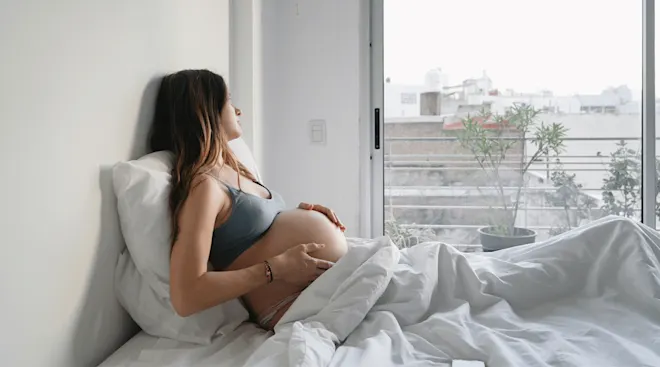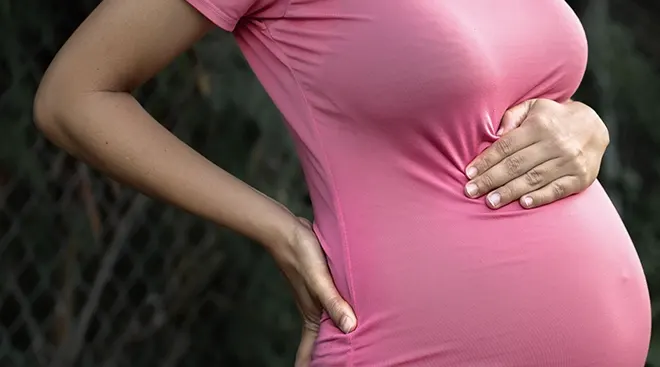How to Deal With Swelling During Pregnancy
There are certain areas of your body that you expect to get larger during pregnancy, like your belly. But it can be alarming when other areas start to swell as well, like your hands and feet. What’s the deal?
Here’s the thing: Some swelling during pregnancy is normal. “About two-thirds of all women will have some form of swelling during pregnancy,” says Michael Cackovic, MD, a maternal-fetal medicine physician at the Ohio State University Wexner Medical Center. But while swelling can just be one of those things that happen during pregnancy, in some situations it can be a sign of a possible complication. Here’s what could be behind your swelling in pregnancy and what to do about it.
A lot of this is a normal side effect of pregnancy, says women’s health expert Jennifer Wider, MD. “For most women, the body produces roughly 50 percent more blood and fluids to maintain the growing needs of the baby,” she says. “Swelling results as a normal part of pregnancy and is caused by the extra blood and fluid.”
That extra fluid is usually evenly distributed in your body, says Sheryl Ross, MD, an ob-gyn and women’s health expert at Providence Saint John’s Health Center in Santa Monica, California, but sometimes it can end up pooling in certain areas of your body—hence those swollen ankles, for example.
Your growing uterus also puts pressure on your veins, and that can make it difficult for your blood to return to your heart, leading to swelling, Wider says.
When does swelling start during pregnancy?
Swelling can start at any time during pregnancy, but most women will first experience it in the second trimester, Wider says. “It will continue into the third trimester until delivery,” she adds. Also, swelling tends to be worse during the day and goes down at night, and may be more pronounced in women who are on their feet all day.
Technically, any part of your body can swell during pregnancy, but it’s most common in the hands, feet, ankles, legs and even your vulva. “It’s a gravity situation,” Cackovic says. “Fluid finds its way to the lowest possible area.” Feet swelling in pregnancy is extremely common—some women’s feet even expand by one shoe size, he adds. Hand swelling is also par for the course. “I always tell patients if their hands are getting tight to get their rings off before it’s too late,” Cackovic says. “Rings may get trapped there.” While fluid tends to pool in lower areas and extremities of the body, some women also experience facial swelling, he says.
Every woman experiences swelling in pregnancy differently, but it can be severe and uncomfortable for some. Swelling in your feet, legs, and ankles can be particularly painful and tricky to deal with, says G. Thomas Ruiz, MD, lead ob-gyn at MemorialCare Orange Coast Medical Center in Fountain Valley, California. “Swelling can be so bad, women have to wear flip-flops because their shoes don’t fit,” he says.
When should swelling during pregnancy be a concern?
While swelling in pregnancy is normal, it can sometimes be a sign of an underlying health condition like a thyroid disorder (such as hypothyroidism and hyperthyroidism), deep vein thrombosis (DVT), an allergy or infection (such as cytomegalovirus or toxoplasmosis), preeclampsia or pregnancy-induced hypertension, Ruiz says.
There are a few signs to look out for to help determine whether your pregnancy swelling is concerning. Ruiz recommends calling your doctor if you experience any of the following along with the swelling:
- Headache
- Blurry vision
- Pain in your upper right side
Having sudden swelling that won’t go down or severe facial swelling that makes you look different should also warrant a call to the doctor, Cackovic says.
Plenty of moms-to-be come to their prenatal care appointments wondering how to reduce swelling in feet during pregnancy. We get it: Swollen feet (or any other body part) in pregnancy can be super-uncomfortable. It’s tempting to think you could just skip the salt and those tootsies will go back to normal, but unfortunately there’s no special diet that will help with swelling in pregnancy if you don’t have an underlying health condition, Ruiz says.
However, there are a few things you can do to get relief if you’re experiencing swelling during pregnancy. According to Ross, the following can help circulate fluid throughout your body and keep it from pooling in your lower extremities:
• Elevate your legs and feet. “Prolonged standing and being on your feet for long periods of time will make the swelling worse,” Ross says, so when you can, put your feet up above the level of your heart and let gravity help reduce some of that swelling.
• Wear compression stockings. If you have to be on your feet for hours or are experiencing persistent swelling, try wearing knee-high or thigh-high compression tights. These special socks have graduated pressure from the foot upward to help prevent the pooling of fluid in the feet and lower legs. “Is it a cure? No. Does it make it feel better? Yes,” Cackovic says.
• Stay cool. Swelling tends to get worse in high temperatures, so “stay inside in the air conditioning if it’s super-hot,” Wider recommends.
• Sleep on your side. Once you’re into your second trimester, it’s best to sleep on your left side instead of your back to avoid putting pressure on an important vein. The good news is that sleeping on your side at night can also help reduce swelling in pregnancy. “It theoretically allows fluid to go back to your kidneys and get released that way,” Cackovic says.
• Apply cold compresses. Especially if you’re experiencing vaginal swelling during pregnancy, “a cool compress might make you feel better,” Cackovic says.
• Skip the salt. “Women are encouraged to watch their sodium intake,” Wider says. Leave the shaker on the table to help avoid retaining even more excess fluids. Note, though, that no special diet is going to fully prevent swelling in pregnancy, due to the physiological changes your body undergoes when you’re expecting, Ruiz says.
If you’re experiencing any hand, ankle, leg, facial, vaginal or feet swelling in pregnancy, it’s a good idea to mention it to your doctor at your next prenatal appointment, just in case, Cackovic says. They may have some individual recommendations that can help. Just keep in mind that you may need to tolerate some level of swelling until you deliver. “With benign swelling, there’s not a lot you can do,” Ruiz says. So kick up those swollen feet and hang in there, mama.
Please note: The Bump and the materials and information it contains are not intended to, and do not constitute, medical or other health advice or diagnosis and should not be used as such. You should always consult with a qualified physician or health professional about your specific circumstances.
Plus, more from The Bump:
Navigate forward to interact with the calendar and select a date. Press the question mark key to get the keyboard shortcuts for changing dates.




















































